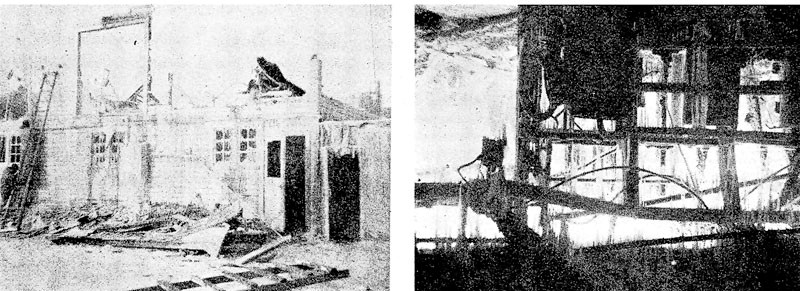While the front-page photo spread of the Lions Club 10th anniversary at the beginning of February 1962 contained a caption saying, “Everyone was in a splendid mood,” events in St. Albert took a sour turn just one week later.
Early in the morning, a fire sparked in the hayloft of the Youville Home and Convent dairy barn, consuming the Grey Nuns’ only commercial enterprise. Besides the loss of the barn, about a dozen cattle perished in the blaze, which also destroyed the nuns’ milking and pasteurizing equipment. Despite the tragedy, the nuns kept the firefighters going with coffee and sandwiches.
There was plenty to write about and front-page editorials seemed to be the main vehicle of discussion. First, the recommendation that St. Albert integrate its phone numbers with Edmonton generated worries of losing “our telephone identity.” Then under the bold headline, “When will we have our own swimming pool?” the Gazette printed a survey ballot asking residents if they wanted a year-round pool and if they were willing to pay an extra $8 annually in property taxes for it.
But the biggest outcry came the following February when a petition began to circulate calling for an investigation of council by the province. With rumours of a $1-million deficit, the petition, printed in the paper, also alleged council was not allowing public participation, was using borrowed money for unauthorized expenses, had no efficient administration, did not pay the school boards their requisitions and was unable to meet its “financial obligations” of $674,000. A municipal inspector revealed in a report that council frequently took action without passing bylaws as required under the Town and Village Act, that it posted a $27,000 deficit in 1961 and showed no improvement for 1962. The town “is in a very poor shape financially,” the report concluded.
And more council decisions met with a negative response. In February 1965, the town votes to rename McKenney Avenue as Sir Winston Churchill Avenue in honour of the former British prime minister, who had died the month previous. Two weeks later, council received an angry letter from McKenney’s granddaughter about the decision, at which time administration was asked to look at other streets that could be so named. Council also decided to name the portion of St. Albert Trail within the town’s boundaries St. Albert Road. It was part of an exercise to name as many roads as quickly as possible with the coming of door-to-door mail delivery. That same month, in a ceremony at Sir Alexander MacKenzie School, the Union Jack was lowered for the final time and the Maple Leaf took its place.
With the centennial year approaching, Mayor Richard Fowler in 1966 called on all residents to volunteer. By Canada’s centennial, the town’s population was 9,828 with the biggest increase in Sturgeon Heights. In total, St. Albert had 52 centennial projects on the go, including the construction of the Centennial Library, as well as tree plantings, a basketball tournament and a local talent show. The following February, Bertha Kennedy, who had been teaching with the Catholic district for 12 years, received a Centennial Medal.
Celebration was replaced with reality in 1968 when a petition successfully halted five spending bylaws that would have purchased equipment and funded street repairs and landscaping. The issue went to a plebiscite. Furthermore, the Gazette started collecting names for a letter to send to the province to express the town’s dismay at the hold-up of construction of Sturgeon General Hospital. When construction finally began in February 1969, it was overshadowed by the results of a recent plebiscite on amalgamation with Edmonton. Of the 40.2 per cent of eligible voters who cast ballots, 1,069 voted in favour of joining the capital city and 860 voted against. Yet within two years that number changed. Municipal census takers, who revealed the town’s population in 1971 was 11,249, also asked residents if they favoured amalgamation. A full 73 per cent of respondents said no.
The town mourned in February 1972 after Lorne Akins, 81, who had celebrated his 50th wedding anniversary the month before, passed away. Besides his 20 years as school board chair and nine years with the Community League, Akins was also noted for 20 years of perfect attendance with the Lions Club.
The population exploded to 15,000 in 1973, prompting the town to install three traffic lights along St. Albert Road. Myrna Fyfe won a byelection to take her seat as an alderman on council and residents also voted in favour of creating local transit in a parallel plebiscite. Council immediately slapped snowmobilers, who used to have free reign of the town, with a new bylaw, forbidding the use of power toboggans on the river, in public parks and on school land.
Februaries 1974 to 1976 passed with little of note, beyond committee of the whole agreements to allow a shopping centre in St. Albert, build a new civic centre downtown and allow women to volunteer with the town’s undermanned fire department. In a 1977 plebiscite, residents overwhelmingly rejected two proposed annexations that would have seen the town grow by 3,500 acres to facilitate new development. While St. Albert was changing, so too was the province. A government ad in February 1977 reminded residents the new minimum wage for adults was $3/hour, $2.85/hour for teenagers working full-time and $2.50 for teenagers working part-time.
Sadly, on a trip to Arizona, former mayor and school board trustee Neil M. Ross, who had spoken at the Akins’ 50th wedding anniversary five years prior, died of complications arising from an aneurysm.
Peter Boer is an editor at the Gazette.




